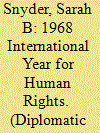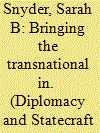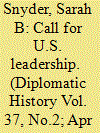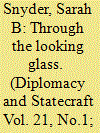| Srl | Item |
| 1 |
ID:
162828


|
|
|
| 2 |
ID:
120424


|
|
|
|
|
| Publication |
2013.
|
| Summary/Abstract |
One of the most interesting innovations in recent international history writing is the adoption of transnational approaches. This article echoes earlier calls for international historians to integrate transnational methods more fully into their work by highlighting the salience of human rights and influence of human rights activism as aspects that would otherwise be largely left out of the history of the Cold War. Such methodological innovation is essential to a deeper understanding of the Cold War.
|
|
|
|
|
|
|
|
|
|
|
|
|
|
|
|
| 3 |
ID:
123840


|
|
|
|
|
| Publication |
2013.
|
| Summary/Abstract |
Before Representative Donald Fraser and the House Foreign Affairs Subcommittee on International Organizations and Social Movements held hearings in 1973 on human rights, the issue had garnered only episodic attention by governmental actors. The subcommittee's resulting report called for "U.S. leadership" on the international protection of human rights, and subsequent legislation implemented many of the subcommittee's recommendations. Taken together, the hearings and their consequences signaled a turning point in U.S. human rights policy as they influenced efforts to reshape the State Department's bureaucracy and formalized attention to human rights as a factor in U.S. policy in the years that followed. Importantly, this congressional activism pre-dated Jimmy Carter's administration and ensured attention to human rights would continue beyond his single term in the White House.
|
|
|
|
|
|
|
|
|
|
|
|
|
|
|
|
| 4 |
ID:
095406


|
|
|
|
|
| Publication |
2010.
|
| Summary/Abstract |
The controversy surrounding the 1975 Helsinki Final Act made it an enduring issue in the 1976 campaign, and the political backlash against President Gerald R. Ford damaged his electoral chances. Ford's signature of the agreement, his continuation of deente, and his foreign policy more broadly may not have been decisive issues in his contests with Ronald Reagan and then Jimmy Carter, but they certainly were prominent throughout the election. Examining the influence of the Final Act on Ford's election campaign illuminates the extent to which a number of candidates sought to use popular opposition to the agreement to their advantage. Furthermore, it reveals how the 1976 presidential candidates, and Ford in particular, struggled to address growing questions about detente, human rights, and morality in foreign policy. Ford's failure to defend his signature of the Final Act adequately raised concerns about his foreign policy and personal leadership with the electorate.
|
|
|
|
|
|
|
|
|
|
|
|
|
|
|
|